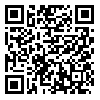BibTeX | RIS | EndNote | Medlars | ProCite | Reference Manager | RefWorks
Send citation to:
URL: http://journal.zums.ac.ir/article-1-153-en.html
Background & objective: Physical complications following esophageal cancer are known as factors that affect the patrent′s quality of life. These symptoms affect the mental, social and emotional aspects of patient′s life adversely. This study was carried out to investigate the effect of self-care education on life quality of patients suffering from esophageal cancer following esophagectomy in selected hospitals of Tehran university of medical sciences.
Materials & Methods: In this quasi-experimental study 77 patients treatment and control groups with esophageal cancer were selected non-randomly regarding their characteristics (35 years old and over, and transhiatal esophagectomy). Three half-hour face-to-face education sessions were held for 40 patients and their families, while 37 patients were regarded as control group. Quality of lift of patients undergoing esophagectomy and the number of problems in both groups were measured through SF36 checklist in two stages: before education and esophagectomy and one month after education and esophagectomy. Finally, life quality and the number of complications were compared in both groups.
Results: Independent t-test revealed that total life quality score before intervention in two groups was not significantly different (p=0.53). Moreover, the same test showed no significant difference in two groups after intervention(P=46). However, paired t-test revealed that total life quality score in treatment group differed significantly before and after intervention (p=0.035). In addition the same test showed a significant difference in control group before and after intervention (p=0.009). Pearson correlation coefficient indicated that there was no significant difference between demographic variables and total life quality score (p>0.05). Paired t-test showed that the number of patient′s complications decreased following the education.
Conclusion: Self-care education following esophagectomy improves the life quality of patients and reduces the complications. Thus, regarding the follow-up period (one month) sample volume, and efficacy of the intervention more comprehensive studies using laryer sample volumes with longer follow-ups are recommended.
Received: 2007/12/6 | Accepted: 2014/06/30 | Published: 2014/06/30
| Rights and permissions | |
 |
This work is licensed under a Creative Commons Attribution-NonCommercial 4.0 International License. |




